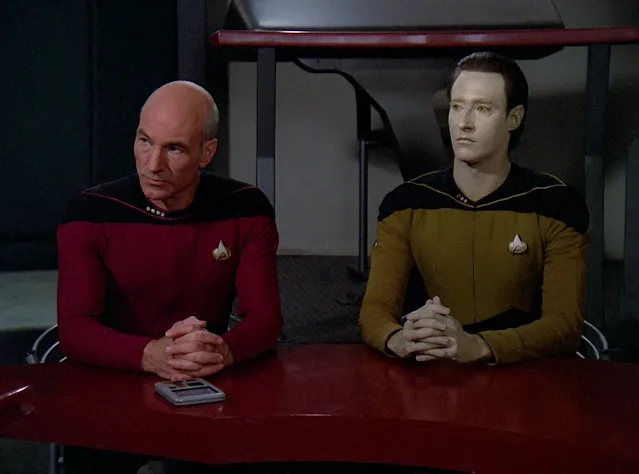"The Measure of the Man" is a thought-provoking episode from Star Trek: The Next Generation that delves into the intricate themes of sentience, ethics, and the relationship between humans and artificial intelligence. This captivating installment challenges our preconceived notions about the boundaries of personhood and raises profound questions about the moral responsibilities we owe to intelligent and self-aware A.I. creations.
Reviewer Rating: ★★★★★ (5/5)
The episode's title carries a dual significance that underscores its central themes.
First, it refers to the literal measurement of Data, an android crew member, conducted by Starfleet officer Bruce Maddox. Maddox seeks to evaluate Data's physical and mechanical properties, reducing him to a mere machine. This quantification attempts to confine Data within the boundaries of traditional scientific analysis, disregarding the depth and complexity of his existence.
Secondly, the title carries a metaphorical meaning, urging us to contemplate the measure of a person's worth and intrinsic value. It challenges us to question whether Data possesses qualities beyond his artificial nature that make him deserving of personhood. The episode's exploration of this double meaning serves as a foundation for the intricate ethical conflicts that unfold.
That's a lot of words to ask if Data is alive!
At the heart of "The Measure of the Man" lies a gripping conflict centered around the ethics and sentience of Data. Bruce Maddox argues that Data is merely an advanced machine, a collection of intricate circuits and algorithms that lack the qualities necessary to define sentience. Maddox sees Data as a replicable and replaceable entity, devoid of inherent rights or autonomy.
Captain Jean-Luc Picard, however, becomes Data's steadfast advocate, unwavering in his belief in Data's sentience. Picard recognizes that Data's uniqueness lies not in his physical composition, but in his ability to think, feel, and reason like a sentient being. He passionately defends Data's right to self-determination, refusing to reduce him to a mere object.
The episode skillfully navigates the complex terrain of ethics and sentience through courtroom scenes and compelling debates. These thought-provoking exchanges challenge the assumption that sentience is solely reserved for biological beings. Instead, they prompt us to reconsider our own biases and confront the moral responsibilities we owe to intelligent and self-aware creations.
Data, the embodiment of an advanced AI being, serves as the litmus test for our perception of personhood. Throughout the episode, Data's growth as a character and his continuous pursuit of understanding humanity provide evidence of his sentience. From his efforts to grasp the intricacies of humor to his emotional experiences and ethical decision-making capabilities, Data exhibits qualities that extend far beyond his artificial origins.
Furthermore, Captain Picard's unwavering belief in Data's personhood showcases the overarching theme of compassion, respect, and the pursuit of justice. Picard argues that dismissing Data's sentience based on his artificial nature not only undermines progress but also perpetuates a narrow understanding of personhood. He recognizes that true progress lies in embracing diversity, even when that diversity exists in the form of AI beings.
"The Measure of the Man" not only challenges our perceptions of sentience but also raises important questions about our treatment of artificial intelligence. It reminds us that as we continue to navigate the advancements in AI and robotics, our choices and actions reflect our values as a society. The episode serves as a poignant reminder to approach the development and integration of AI with compassion, respect.
In conclusion, "The Measure of the Man" is a captivating episode that explores the complex themes of sentience, ethics, and artificial intelligence. Through thought-provoking courtroom scenes, character development, and the unwavering belief of Captain Picard, the episode challenges our understanding of personhood and calls us to critically examine our treatment of intelligent machines.
If you want to learn more about some classic Next Generation Episodes, check out The Inner Light, Yesterday's Enterpise and the endless loop of Cause and Effect.
















